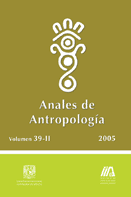Memoria colectiva de un éxodo. Los nuevos poblados zapatistas en la selva
Main Article Content
Abstract
Originally from communities openly supporting zapatistas. Hundreds of tsotsiles and ch’oles families that were displaced from their communities because of conflict, together with tseltales that were already in the region, formed new populations, in lands recovered by the zapatistas in 1994. A primordial characteristic in the new settings of the forest was pluriculturality. Its original inhabitants of communities, landscapes and municipalities –all distant and different from each other– are now together living and sharing the same destiny. In their own words, the protagonists relate how –from the domestic and comunitarian environment to the regional one– they rescue, live, build and reinvent their memory. The role that the exodus speech plays is fundamental to understanding the space appropriation processes in rebel territory. The forest is at the same time the origin and the destiny, the ideal place to project, configure and (con)found the future, past and present.
Downloads
Download data is not yet available.
Article Details
How to Cite
García González, O. (2009). Memoria colectiva de un éxodo. Los nuevos poblados zapatistas en la selva. Annals of Anthropology, 39(2). https://doi.org/10.22201/iia.24486221e.2005.2.9967
Esta revista usa una licencia CC del tipo CC BY-NC-ND 3.0. Se maneja bajo el esquema de acceso abierto, con una licencia Creative Commons Attribution-NonCommercial-NoDerivs 3.0 Unported.
